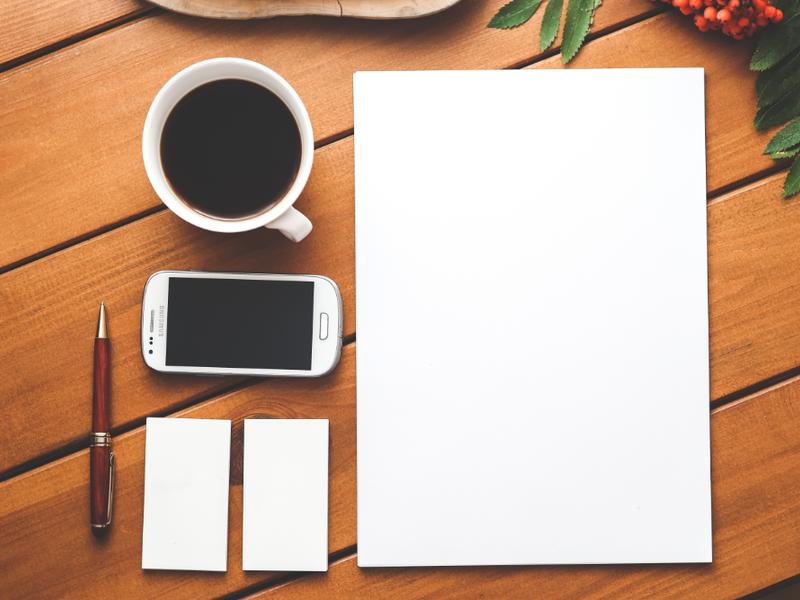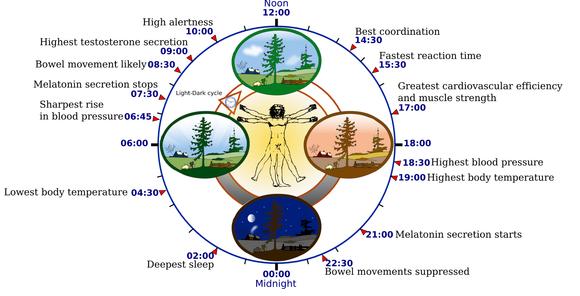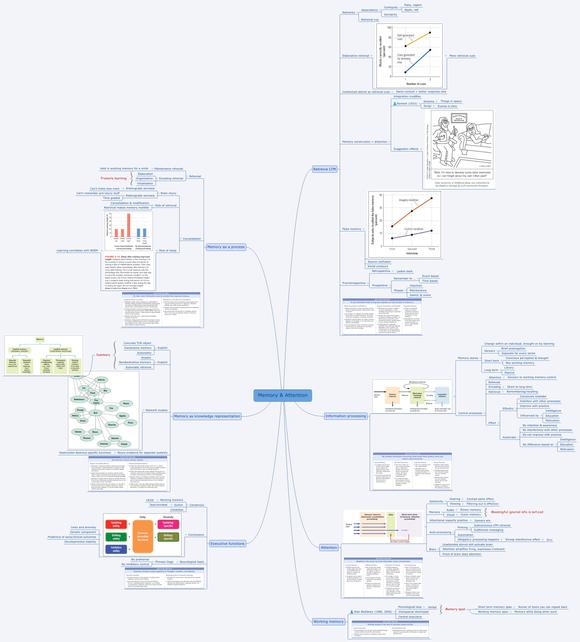I knew this year would be a challenge. The biggest things in my life in 2015/2016 are:
- A fulltime Master's degree (est spend 50hr/week incl classes)
- A job teaching in a different city (est spend 36h/week incl travel)
- A long distance relationship (est spend as much as possible)
My average 'busy' time is about 80 hours per week since the travel time to work often includes some class prep. Note also that the above doesn't include side projects like this blog, learning new programming skills etc. This is the recap of how I'm still alive and mostly smiling.
DIY Getting started
The things below can seem overwhelming. If you are not sure where/how to implement them, start like this:
- Create a day 'template', start simple and work your way up
- Fix your food, this gives a lot of impact
- Before doing any task, consider whether it will have an impact on your life a month from now
- Meditate using the Headspace app
- Always collaborate with other people where possible
Habits
Structure is life
If you have time to spare, you can afford some irregularity. I do not. To stay sane I have to work with the body's powerful need for a set rhythm.
My day has very clear structure:
- Wake up
- Get up at 06:00
- Shower cold
- Get dressed
- Kickoff
- If I work in the morning, take the train and start 1.5h travel
- If I have class in the morning, work/study till 8:30 and leave to class
- Food time
- I used to start eating at 16:00 (see intermittent fasting), but since I sleep earlier I now start at 12:30
- Come home & eat proper meal
- 19:00 if I was teaching that day (due to travel time)
- 17:30 - 18:00 if I had class that day
- Go to bed
- 20:30 start meditation and winding down
- 21:00-21:30 close my eyes and use sleep technique
Let's take Monday as an example:
- 6:00 Wake up
- 6:15 I'm now dressed and start my computer
- Spend time making study mindmaps, preparing teaching classes, learning new skills
- 8:30 Time to head to class
- If class is interesting, engage fully
- If class loses effectiveness, start casual-learning tasks
- 13:00 Class ends
- Powerwalk to the train station
- Study/work in the train
- 15:00 Arrive at school and start teaching
- 17:15 teaching ends, catch train
- Work/study in the train
- 19:00 Arrive home
- Cook meal
- Watch an episode of something during food
- Play a game occasionally
- 20:30 Start winding down routine
- 21:00 Lie in bed, read some light stuff
- 21:00-21:30 Fall asleep
Fasting is fuel, and so is food
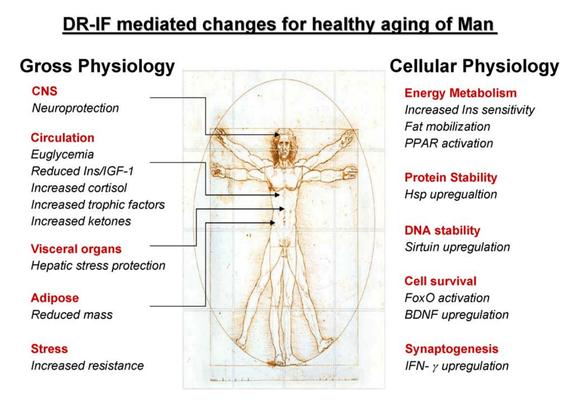 Source: Caloric restriction and intermittent fasting: Two potential diets for successful brain aging (2006)
Source: Caloric restriction and intermittent fasting: Two potential diets for successful brain aging (2006)
Intermittent fasting (not eating for 16 hours a day) allows me to focus very well in the first block of the day. But when I do start eating, the food has to be high quality to fuel my body and mind.
I don't eat for a long time because:
- It allows me to focus better
- It removes the need to worry about finding healthy food
- It has many health benefits, including stress resistance
When I do not eat, I drink:
- A Matcha tea in the morning
- A Bulletproof Matcha if I know this day will be intense
- No more coffee than 1 or 2 espresso a week
- Green tea whenever possible
- Black teas when green is unavailable
- Water if no tea is available
- No sweeteners/sugar/milk
When I do eat, I eat:
- Low GI foods (glycemic index)
- Home made energy bars when on the road
- High vegetable & energy meals
- High quality ingredients
Guard two resources: Time and Mental power
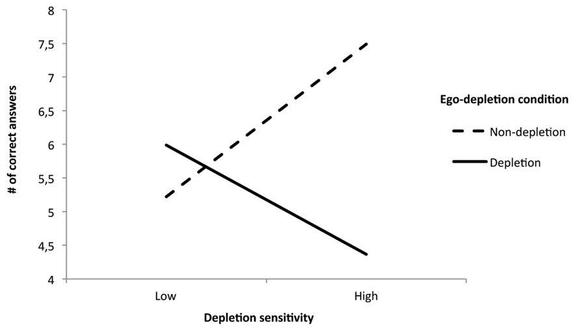
Source: “When the going gets tough, who keeps going?” Depletion sensitivity moderates the ego-depletion effect (2014)
Guard them both like a mother does its pups.
Manage your time and mental juice:
- Reduce the amount of decisions you need to make Every decision costs mental juice. Make pre-defined choices for recurring tasks and moments where your judgement could falter.
- Focus on effectiveness, not efficiency You can be very efficient at reading the daily news, but it will have no impact on your daily life. You can instead do the effective task of planning your day in the same time. one will make you feel depressed, the other in control.
Example: will this task have impact on the future you?
- If a task is urgent, be especially skeptical
- Mentally fast-forward to next month, will doing this task have a positive impact on your life then?
- Yes? Do it.
- No? Outsource it or decline the task
- Maybe? Do other things first
- What will have a bigger impact, doing this task or not doing this task?
Examples of ignore/outsource tasks:
- Someone emailed you asking a question they could answer using Google
- Respond: "Sorry, I'm having a hectic week. You should be able to find this on Google within some minutes."
- An old client is asking you to update/re-do part of a job you did
- Respond: "Sorry, this assignment was finished. If you'd like to hire me again, please send over exactly what you'd like done and we'll work towards a solution"
- Your boss/co-worker asks for a 10 page document by next week, and you know if will only be relevant for 1 meeting
- Respond: "Sure can do this, but you'll need to allocate some in my schedule by taking task X from me instead."
Get the picture?
Example: don't decide what you will eat
Many people make bad food choices, because they need to make good decisions 5 times a day 7 days a week. Bring it down to 2 times, once a week.
- Buy groceries on a full stomach in the weekend
- Buy some healthy indulgences for when you feel like 'guilt eating'
- For me: raspberries, a good steak, good cheese, good wine
- Make energy bars or other portable food for during work
Your body is your hardware: use it well
I see my body as the hardware I run on. People have a lot of physical habits that are equivalent to leaving the hand break on while driving.
Give your body what it needs:
- Eat well
- Sit up with good posture
- Stretch a couple of times a day
- Where possible do some mild exercise
- Drink plenty, preferably green tea
Examples of what I do:
- Stretch with one leg on the desk while reading
- Do some squats/push up when I go to the bathroom
- Roll my shoulders every once in a while while typing
- Jog from train track to train track
Your mind is software, do maintenance
Good hardware means nothing without good software (programs) and maintenance.
What does mind maintenance mean?
Imagine using a computer. You start all sorts of stuff all the time. After an hour or two you are stuck with:
- A gazillion open browser tabs
- 2 or 3 programs that don't need to be open
- All sorts of temporary files you don't even see
And what happens?
- Your computer feels far slower compared to when you started it
- The battery runs out faster
- if the situation is really bad, it crashes
How to keep your mind running smooth:
- Meditate during the day, I use Headspace
- If you think of a task, write it down and push it from your mind
- Are you worried about something? Deal with it
- Is it irrational? Meditate
- Use reading and learning techniques
Techniques
Use mind mapping for digesting knowledge
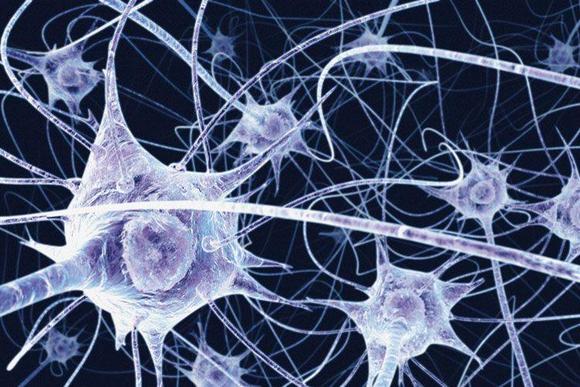 Picture credit: Rebecca Radcliff
Picture credit: Rebecca Radcliff
The human mind does not think linearly, it thinks in networks and patterns. Use that.
Why use mindmaps?
- The brain is a neural network where elements are connected to each other in multiple ways
- Mindmaps link and group concepts, which makes it easier for the mind to absorb
- Making a mindmap makes you remember more that for example highlighting
Personally I use Xmind to make my mindmaps.
Mindmap example
This is a mindmap I made for a psychology chapter on memory and attention:
Collaborate, always collaborate
Dropbox works well because most people have it. Team up with people, don't do alone what you could do together.
Always share and always profit
I always share my mindmaps, notes and ideas. Example? I spent hours writing this article for free...
- Always share what you have, it doesn't cost you anything
- Ask people to share what they have
- Most will if you have shared your materials first
- Assume the best in people
- Free riders are irrelevant. Copy-paste costs nothing.
- Even if 10% of people help, you gained a big 'team'
Why do this?
- People appreciate it, you gain credit
- If you are ever in trouble, people are very willing to help
- Your work becomes better, because you try to make it easier to understand
Examples of where I applied this:
- My bachelors, I started a Dropbox folder with summaries. We ended up with hundreds of users and summaries of 70-90% of all courses
- Now in my masters. it's a smaller group, but we basically have summaries of everything so far
5 Minutes is the minimum productivity block
Got 5 minutes waiting for a train? Open your laptop and work. Less that 5 minutes? Chill.
Make vague tasks very concrete
The mind is a funny thing. It doesn't like the unknown, probably something evolutionary. Vague tasks are unknown, thus you will often not feel motivated.
Make tasks concrete:
- First define why this task is important
- Define concrete subtasks
- Define how much time these subtasks should take
- In your mind plan when you will do these tasks (ish)
Examples of vague and concrete tasks
Let's say you have an exam in 3 days and have done no studying yet (though of course you have been making mindmaps and sharing them). This task seems daunting and demotivating:
- Study for the exam
What will get you started much easier is:
- Scan my mindmaps (15 minutes each)
- Explain my mindmaps to an imaginary person (15 minutes each)
- Read through summaries of classmates (10 minutes each)
- Do mindmaps tomorrow
- Do summaries day after tomorrow
- Sleep well before exam
Suddenly you have a very clear roadmap, and starting becomes a lot easier.
No motivation? Start with 5 minutes
The mind has a starting threshold. Often when you start a task with the idea "I'll do it for 5 minutes and then I'll stop" ends up with a productive session of an hour or so.
If you feel demotivated, just start and allow yourself to stop if it really isn't working after 5 minutes.
Explain things to imaginary people
This is called the Feynman Technique. Scott Young does a great breakdown in this pdf.
How to use the Feynman technique
- Pick a topic
- Explain it to an imaginary person
- Assume the person doesn't know the field very well
2 Ways I use it:
- Walk through my mindmaps while explaining what everything means
- Standing up and giving an imaginary lecture
Productively procrastinate
You will get distracted, period. When that happens, you need a 'default activity' that is not entirely useless.
Sometimes you will do useless things anyway, but if you can capitalize on 70% of procrastination time that's an epic win.
How I productively procrastinate
- Learn new programming languages in a fun way on Codecademy
- Learn new human languages with Duolingo
- Stay tuned on specific developments on Reddit (example, Ethereum)
Have effective 'mindless' tasks
Sometimes you are in a meeting/lecture that is not effective. You want to pay 50% attention, but want to do something other than stare at a wall with the other 50%.
indless task examples
A mindless task is one that requires little attention. In my case:
- Put images in an article I wrote
- Test a script I've been writing
- Do some casual productive procrastination
- Answer simple emails
Tools
A laptop with good battery life
A laptop is not an expense, it is a valuable investment. It sounds basic, but less than 5 hours battery is a liability.
It will gain you time
Remember your 2 basic resources: time and mental power. With a good laptop:
- Time in a train becomes working time
- Waiting for a meeting for 15 minutes becomes working time
- All little bits in a day add up to hours and hours of extra time
What is gains me
- Two times 1.5 hours of productivity in the train a day
- A number of quarter hours waiting for stuff
- Useless little moments add up to about 1 hour of productivity a day
That's about 4-5 hours of extra productivity time!
A phone with a large data limit
Without internet the above laptop loses effectiveness while on the move. You need to tether your phone.
What's tethering?
Tethering is making your phone into a wifi hotspot. It's easy, but takes up quite some battery if you do it for extended periods of time like I do.
A high capacity battery pack
Tethering and other productive phone uses drain the battery, you need to be able to recharge it on the go. I recommend the Outdoortech kodiak Plus 10k.
A good backpack
I used to underestimate this, a good backpack saves you frustration, time and effort. I'm currently reviewing Bluelounge's eco friendly backpack.
Wakeup Light Alarmclock

This alarm clock slowly increases light in your room and ends with a nice alarm sound.
The human body responds to light
- In nature the sun indicates the start of a day
- By using light that slowly increases you simulate dawn
- You'll wake up far more rested and relaxed
I use a Philips Wakeup light.
How I use it
- 20 minute 'dawn' window
- Chirping birds as alarm sound
- I keep the light on next to my computer screen when I work in the morning
- If I feel tired I stare into the light for 10 minutes or so
Wear sunglasses at night
Your brain responds to light, I wear sunglasses (inside the house) after 20:30.
Why do this?
- Remember the body clock at the beginning of the article? Light has a big impact.
- Reality doesn't have a brightness switch
Instructions
- Wear it an hour before you go to sleep
- Combine it with setting any screens you look at to low brightness
- Keep it near your bed in case you need to go to the bathroom in the middle of he night
I love my Sungods.
Wear earplugs when going to sleep
I live in a house with two other working guys, but their rhythm is later.
Why this matters
- Little sounds can keep you awake
- Unexpected sounds can wake you up
- For me personally the shower/bathroom is the room next to my bedroom
What plugs to use and when
- I use Alpine Party Plugs
- I also have them on my keychain in case of unexpected noise/party during the day/weekend
- Wear them when going to bed
- Wearing them when you put on your sunglasses works great too
Use the right software
I could probably write a whole article about this, so we'll just run through some of my favorites quickly.
The basics
- Chrome for webbrowsing
- Avast antivirus
- VLC for video playback
- Spotify for music
- Evernote for notes
- You Need A Budget (YNAB) for budgeting
For workflow
- F.lux to control brightness in sync with the sun
- Microsoft Office family subscription for unlimited cloud storage and all office apps
- Ditto clipboard manager
- Sublime text 3 for code
- OpenVPN (for example GenerousVPN) for securing public connections
Phone apps
- Whatsapp/telegram for (secure) messaging
- Google Inbox for emails
- Camscanner for scanning receipts
- Cerberus anti theft
- Headspace meditation app
- Lux Dash brightness control
- Unified Remote for laptop control (e.g. powerpoints)
Supplements

Note: I take these because they have beneficial effects to the best of my knowledge. Perhaps in 5 years science finds otherwise. Until then, I do what seems best.
Fish Oil
Good for the brain, mental performance and the eyes.
Dosage/usage
- Fish oil is a long term supplement
- Minimum of 3 grams a day
- Up to 10 grams a day
Magnesium
Mineral used in brain, immune system and pretty much everything else. Also known as 'relaxation mineral', depletes faster under stress.
Dosage/usage
- Use high quality, never magnesium-oxide (check label)
- I use Magnesium lactate powder mixed with water and my creatine
- 500mg elementary magnesium a day
- Better results if spread over the day
Vitamin D
One of the biggest deficiency in the world probably. Works on mood, immune system, bones etc. It's a steroid hormone.
Dosage/usage
- 1000IU to 5000IU is a decent dosage
- I take 10,000IU a day in the winter
- Preferably get a blood test
- Under 100nm/L is a deficiency
Creatine
Usually taken for muscle performance, but also has effect on mental performance.
Dosage/usage
- First 3 days
- Bodyweight x 0.3 = dosage in grams
- After that
- Bodyweight x 0.03 = dosage in grams
- I take a teaspoon a day
Multivitamin
Nutritional insurance policy. This is additional to a proper diet. Note that men and women hae different needs.
Choosing a multivitamin
- Get one with a high dosage
- Stay away from cheap/discount ones
- I like the brand rainbow light
- Labdoor is a great comparison site
Note on breaks and chilling out
Nobody can run full speed 24/7, and that is not the point anyway. All the above I do when I'm in 'work like a machine mode'. Give yourself time and space to relax and calm down as well. I like:
- Having tea breaks where I just stare into space
- Standing in the sunshine listening to music
- Playing computergames before class (Borderlands!)
These times should be boxed though and not undefined. Once in a while say to yourself 'the coming 30 minutes I'm just chilling'.
